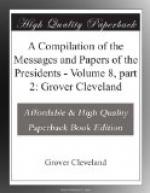On the 24th of December, 1799, it was resolved by Congress that a marble monument should be erected by the United States in the Capitol at the city of Washington; that the family of General Washington should be requested to permit his body to be deposited under it, and that the monument be so designed as to commemorate the great events of his military and political life. In reminding Congress of this resolution and that the monument contemplated by it remains yet without execution, I shall indulge only the remarks that the works at the Capitol are approaching to completion; that the consent of the family, desired by the resolution, was requested and obtained; that a monument has been recently erected in this city over the remains of another distinguished patriot of the Revolution, and that a spot has been reserved within the walls where you are deliberating for the benefit of this and future ages, in which the mortal remains may be deposited of him whose spirit hovers over you and listens with delight to every act of the representatives of his nation which can tend to exalt and adorn his and their country.
The Constitution under which you are assembled is a charter of limited powers. After full and solemn deliberation upon all or any of the objects which, urged by an irresistible sense of my own duty, I have recommended to your attention should you come to the conclusion that, however desirable in themselves, the enactment of laws for effecting them would transcend the powers committed to you by that venerable instrument which we are all bound to support, let no consideration induce you to assume the exercise of powers not granted to you by the people. But if the power to exercise exclusive legislation in all cases whatsoever over the district of Columbia; if the power to lay and collect taxes, duties, imposts, and excises, to pay the debts and provide for the common defense and general welfare of the United States; if the power to regulate commerce with foreign nations and among the several States and with the Indian tribes, to fix the standard of weights and measures, to establish post-offices and post-roads, to declare war, to raise and support armies, to provide and maintain a navy, to dispose of and make all heedful rules and regulations respecting the territory or other property belonging to the United States, and to make all laws which shall be necessary and proper for carrying these powers into execution—if these powers and others enumerated in the Constitution may be effectually brought into action by laws promoting the improvement of agriculture, commerce, and manufactures, the cultivation and encouragement of the mechanic and of the elegant arts, the advancement of literature, and the progress of the sciences, ornamental and profound, to refrain from exercising them for the benefit of the people themselves would be to hide in the earth the talent committed to our charge—would be treachery to the most sacred of trusts.




